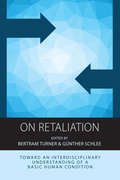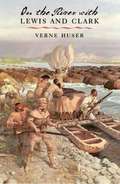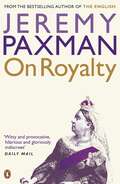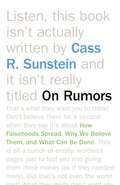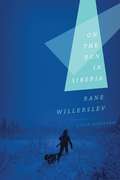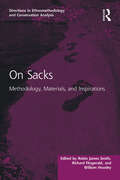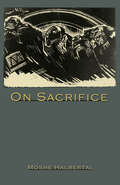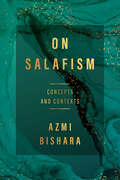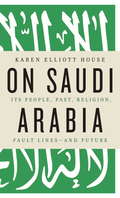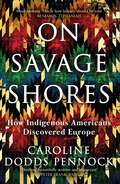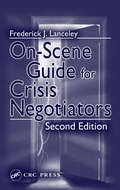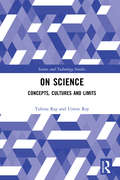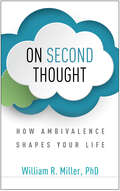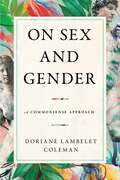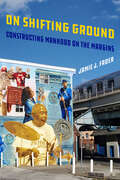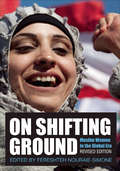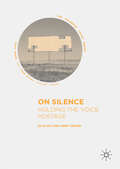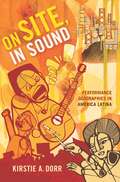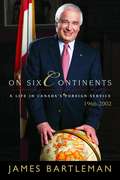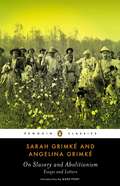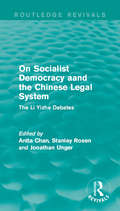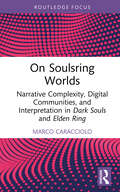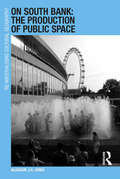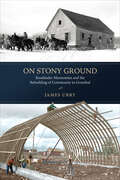- Table View
- List View
On Retaliation: Towards an Interdisciplinary Understanding of a Basic Human Condition (Integration and Conflict Studies #15)
by Günther Schlee Bertram TurnerRetaliation is associated with all forms of social and political organization, and retaliatory logics inform many different conflict resolution procedures from consensual settlement to compensation to violent escalations. This book derives a concept of retaliation from the overall notion of reciprocity, defining retaliation as the human disposition to strive for a reactive balancing of conflicts and injustices. On Retaliation presents a synthesized approach to both the violence-generating and violence-avoiding potentials of retaliation. Contributors to this volume touch upon the interaction between retaliation and violence, the state's monopoly on legitimate punishment and the factors of socio-political frameworks, religious interpretations and economic processes.
On The River With Lewis and Clark
by Verne HuserRiver guide describes Lewis and Clark's expedition, includes descriptions of their canoes and excerpts from their journals
On Royalty: A Very Polite Inquiry Into Some Strangely Related Families
by Jeremy PaxmanWhat is the point of Kings and Queens? What do they do all day? And what does it mean to be one of them? Jeremy Paxman is used to making politicians explain themselves – but royalty has always been off limits. Until now. In On Royalty he delves deep into the past and takes a long hard look at our present incumbents to find out just what makes them tick. Along the way he discovers some fascinating and little-known details. Such as: • how Albania came to advertise in England for a king• which English queen gave birth in front of 67 people• how easy it is to beat up future kings of England • and how meeting the Queen is a bit scary – whoever you are …No other book will tell you quite as much about our kings, queens, princes and princesses: who they are and what they’re for.
On Rumors: How Falsehoods Spread, Why We Believe Them, and What Can Be Done
by Cass R. SunsteinMany of us are being misled. Claiming to know dark secrets about public officials, hidden causes of the current economic situation, and nefarious plans and plots, those who spread rumors know precisely what they are doing. And in the era of social media and the Internet, they know a lot about how to manipulate the mechanics of false rumors—social cascades, group polarization, and biased assimilation. They also know that the presumed correctives—publishing balanced information, issuing corrections, and trusting the marketplace of ideas—do not always work. All of us are vulnerable.In On Rumors, Cass Sunstein uses examples from the real world and from behavioral studies to explain why certain rumors spread like wildfire, what their consequences are, and what we can do to avoid being misled. In a new afterword, he revisits his arguments in light of his time working in the Obama administration.
On The Run In Siberia
by Rane Willerslev Coilin OhaiseadhaRecounts the Danish anthropologist's year living in exile in Siberia among Yukaghir hunters after fleeing from the police, who were set to arrest him because of his efforts to organize a fair-trade fur cooperative with the hunters.
On Sacks: Methodology, Materials, and Inspirations (Directions in Ethnomethodology and Conversation Analysis)
by Robin James SmithThis book is devoted to the reintroduction of the remarkable approach to sociological inquiry developed by Harvey Sacks. Sacks’s original analyses – concerned with the lived detail of action and language-in-interaction, discoverable in members’ actual activities – demonstrated a means of doing sociology that had previously seemed impossible. In so doing, Sacks provided for highly technical, detailed, yet stunningly simple solutions to some of the most trenchant troubles for the social sciences relating to language, culture, meaning, knowledge, action, and social organisation. In this original collection, scholars working in a range of different fields, including sociology, human geography, communication and media studies, social psychology, and linguistics, outline the ways in which their work has been inspired, influenced, and shaped by Sacks’s approach, as well as how their current research is taking Sacks’s legacy forward in new directions. As such, the collection is intended to provide both an introduction to, and critical exploration of, the work of Harvey Sacks and its continued relevance for the analysis of contemporary society.
On Sacrifice
by Moshe HalbertalThe idea and practice of sacrifice play a profound role in religion, ethics, and politics. In this brief book, philosopher Moshe Halbertal explores the meaning and implications of sacrifice, developing a theory of sacrifice as an offering and examining the relationship between sacrifice, ritual, violence, and love. On Sacrifice also looks at the place of self-sacrifice within ethical life and at the complex role of sacrifice as both a noble and destructive political ideal. In the religious domain, Halbertal argues, sacrifice is an offering, a gift given in the context of a hierarchical relationship. As such it is vulnerable to rejection, a trauma at the root of both ritual and violence. An offering is also an ambiguous gesture torn between a genuine expression of gratitude and love and an instrument of exchange, a tension that haunts the practice of sacrifice. In the moral and political domains, sacrifice is tied to the idea of self-transcendence, in which an individual sacrifices his or her self-interest for the sake of higher values and commitments. While self-sacrifice has great potential moral value, it can also be used to justify the most brutal acts. Halbertal attempts to unravel the relationship between self-sacrifice and violence, arguing that misguided self-sacrifice is far more problematic than exaggerated self-love. In his exploration of the positive and negative dimensions of self-sacrifice, Halbertal also addresses the role of past sacrifice in obligating future generations and in creating a bond for political associations, and considers the function of the modern state as a sacrificial community.
On Salafism: Concepts and Contexts (Stanford Studies in Middle Eastern and Islamic Societies and Cultures)
by Azmi BisharaOn Salafism offers a compelling new understanding of this phenomenon, both its development and contemporary manifestations. Salafism became associated with fundamentalism when the 9/11 Commission used it to explain the terror attacks and has since been connected with the violence of the so-called Islamic State. With this book, Azmi Bishara critically deconstructs claims of continuity between early Islam and modern militancy and makes a counterargument: Salafism is a wholly modern construct informed by specific sociopolitical contexts. Bishara offers a sophisticated account of various movements—such as Wahabbism and Hanbalism—frequently collapsed into simplistic understandings of Salafism. He distinguishes reformist from regressive Salafism, and examines patterns of modernization in the development of contemporary Islamic political movements and associations. In deconstructing the assumptions of linear continuity between traditional and contemporary movements, Bishara details various divergences in both doctrine and context of modern Salafisms, plural. On Salafism is a crucial read for those interested in Islamism, jihadism, and Middle East politics and history.
On Saudi Arabia: Its People, Past, Religion, Fault Lines - and Future
by Karen Elliott HouseFrom the Pulitzer Prize-winning reporter who has spent the last thirty years writing about Saudi Arabia--as diplomatic correspondent, foreign editor, and then publisher of The Wall Street Journal--an important and timely book that explores all facets of life in this shrouded Kingdom: its tribal past, its complicated present, its precarious future. Through observation, anecdote, extensive interviews, and analysis Karen Elliot House navigates the maze in which Saudi citizens find themselves trapped and reveals the mysterious nation that is the world's largest exporter of oil, critical to global stability, and a source of Islamic terrorists. In her probing and sharp-eyed portrait, we see Saudi Arabia, one of the last absolute monarchies in the world, considered to be the final bulwark against revolution in the region, as threatened by multiple fissures and forces, its levers of power controlled by a handful of elderly Al Saud princes with an average age of 77 years and an extended family of some 7,000 princes. Yet at least 60 percent of the increasingly restive population they rule is under the age of 20. The author writes that oil-rich Saudi Arabia has become a rundown welfare state. The public pays no taxes; gets free education and health care; and receives subsidized water, electricity, and energy (a gallon of gasoline is cheaper in the Kingdom than a bottle of water), with its petrodollars buying less and less loyalty. House makes clear that the royal family also uses Islam's requirement of obedience to Allah--and by extension to earthly rulers--to perpetuate Al Saud rule. Behind the Saudi facade of order and obedience, today's Saudi youth, frustrated by social conformity, are reaching out to one another and to a wider world beyond their cloistered country. Some 50 percent of Saudi youth is on the Internet; 5.1 million Saudis are on Facebook. To write this book, the author interviewed most of the key members of the very private royal family. She writes about King Abdullah's modest efforts to relax some of the kingdom's most oppressive social restrictions; women are now allowed to acquire photo ID cards, finally giving them an identity independent from their male guardians, and are newly able to register their own businesses but are still forbidden to drive and are barred from most jobs. With extraordinary access to Saudis--from key religious leaders and dissident imams to women at university and impoverished widows, from government officials and political dissidents to young successful Saudis and those who chose the path of terrorism--House argues that most Saudis do not want democracy but seek change nevertheless; they want a government that provides basic services without subjecting citizens to the indignity of begging princes for handouts; a government less corrupt and more transparent in how it spends hundreds of billions of annual oil revenue; a kingdom ruled by law, not royal whim. In House's assessment of Saudi Arabia's future, she compares the country today to the Soviet Union before Mikhail Gorbachev arrived with reform policies that proved too little too late after decades of stagnation under one aged and infirm Soviet leader after another. She discusses what the next generation of royal princes might bring and the choices the kingdom faces: continued economic and social stultification with growing risk of instability, or an opening of society to individual initiative and enterprise with the risk that this, too, undermines the Al Saud hold on power. A riveting book--informed, authoritative, illuminating--about a country that could well be on the brink, and an in-depth examination of what all this portends for Saudi Arabia's future, and for our own.From the Hardcover edition.
On Savage Shores: How Indigenous Americans Discovered Europe
by Caroline Dodds PennockWe have long been taught to presume that modern global history began when the 'Old World' encountered the 'New', when Christopher Columbus 'discovered' America in 1492. But, as Caroline Dodds Pennock conclusively shows in this groundbreaking book, for tens of thousands of Aztecs, Maya, Totonacs, Inuit and others - enslaved people, diplomats, explorers, servants, traders - the reverse was true: they discovered Europe. For them, Europe comprised savage shores, a land of riches and marvels, yet perplexing for its brutal disparities of wealth and quality of life, and its baffling beliefs. The story of these Indigenous Americans abroad is a story of abduction, loss, cultural appropriation, and, as they saw it, of apocalypse - a story that has largely been absent from our collective imagination of the times. From the Brazilian king who met Henry VIII to the Aztecs who mocked up human sacrifice at the court of Charles V; from the Inuk baby who was put on show in a London pub to the mestizo children of Spaniards who returned 'home' with their fathers; from the Inuit who harpooned ducks on the Avon river to the many servants employed by Europeans of every rank: here are a people who were rendered exotic, demeaned, and marginalised, but whose worldviews and cultures had a profound impact on European civilisation. Drawing on their surviving literature and poetry and subtly layering European eyewitness accounts against the grain, Pennock gives us a sweeping account of the Indigenous American presence in, and impact on, early modern Europe.
On-Scene Guide for Crisis Negotiators
by Frederick J. Lanceley William R. CrandallAccording to author Frederick J. Lanceley one of the world's foremost crisis negotiation authorities negotiators must train and train regularly. For just as the legal field constantly evolves, so does the field of crisis negotiation. The new edition of On-Scene Guide for Crisis Negotiators reflects this fact. A bestseller in its first edition, this
On Science: Concepts, Cultures and Limits (Science and Technology Studies)
by Tuhina Ray Urmie RayOn Science: Concepts, Cultures, and Limits explores science and its relationship with religion, philosophy, ethics, mathematics, and with socio-economic changes. The book gives an overview of the metaphysical contexts in which science emerged and the particular forms science has taken in history. It examines the preoccupation of ancient cultures with the validity of interpretations of natural phenomena, the role of the study of materials in the substantiation of the conceptual world, and the establishment of modern science on both experimentation and mathematics. This theoretical discussion is illustrated by a host of examples from physics to the life sciences, which highlight how current concepts developed over the centuries, or even millennia. The volume underscores some of the weaknesses inherent in a scientific approach, and how in the modern context of a wealth-driven technological orientation, these have been conducive to a gradual distortion of science into its exact opposite, a dogmatic faith. It further discusses the nature of scientific education in the world, and how conditions can be created to ensure pioneering creativity and to preserve scientific rigor. The book will be of great interest to scholars, teachers and researchers of science, the metaphysics and philosophy of science, mathematics, science and technology studies, epistemology, ethics, history and sociology. It will also be useful for general readers who are interested in the history of scientific discoveries and ideas as well as in the issues surrounding science today, in particular its relations with many urgent problems.
On Second Thought: How Ambivalence Shapes Your Life
by William R. MillerThe rich inner world of a human being is far more complex than either/or. You can love and hate, want to go and want to stay, feel both joy and sadness. Psychologist William Miller--one of the world's leading experts on the science of change--offers a fresh perspective on ambivalence and its transformative potential in this revealing book. Rather than trying to overcome indecision by force of will, Dr. Miller explores what happens when people allow opposing arguments from their &“inner committee members&” to converse freely with each other. Learning to tolerate and even welcome feelings of ambivalence can help you get unstuck from unwanted habits, clarify your desires and values, explore the pros and cons of tough decisions, and open doorways to change. Vivid examples from everyday life, literature, and history illustrate why we are so often "of two minds," and how to work through it.
On Settling
by Robert E. GoodinThe hidden value of settlingIn a culture that worships ceaseless striving, "settling" seems like giving up. But is it? On Settling defends the positive value of settling, explaining why this disdained practice is not only more realistic but more useful than an excessive ideal of striving. In fact, the book makes the case that we'd all be lost without settling—and that even to strive, one must first settle.We may admire strivers and love the ideal of striving, but who of us could get through a day without settling? Real people, confronted with a complex problem, simply make do, settling for some resolution that, while almost certainly not the best that one could find by devoting limitless time and attention to the problem, is nonetheless good enough. Robert Goodin explores the dynamics of this process. These involve taking as fixed, for now, things that we reserve the right to reopen later (nothing is fixed for good, although events might always overtake us). We settle on some things in order to concentrate better on others. At the same time we realize we may need to come back later and reconsider those decisions. From settling on and settling for, to settling down and settling in, On Settling explains why settling is useful for planning, creating trust, and strengthening the social fabric—and why settling is different from compromise and resignation.So, the next time you're faced with a thorny problem, just settle. It's no failure.
On Sex and Gender: A Commonsense Approach
by Doriane Lambelet ColemanAn eye-opening account of what the left and right get wrong about sex and gender—and how we can be a thoughtful, sex-smart society.On Sex and Gender focuses on three sequential and consequential questions: What is sex as opposed to gender? How does sex matter in our everyday lives? And how should it be reflected in law and policy? All three have been front-and-center in American life and politics since the rise of the trans rights movement: They are included in both major parties&’ political platforms. They are the subject of ongoing litigation in the federal courts and of highly contentious legislation on Capitol Hill. And they are a pivotal issue in the culture wars between left and right playing out around dinner tables, on campuses and school boards, on op-ed pages, and in corporate handbooks. Doriane Coleman challenges both sides to chart a better way. In a book that is equal parts scientific explanation, historical examination, and personal reflection, she argues that denying biological sex and focusing only on gender would have detrimental effects on women&’s equal opportunity, on men&’s future prospects, and on the health and welfare of society. Structural sexism needed to be dismantled—a true achievement of feminism and an ongoing fight—but going forward we should be sex smart, not sex blind. This book is a clear guide for reasonable Americans on sex and gender—something everyone wants to understand but is terrified to discuss. Coleman shows that the science is settled, but equally that there is a middle ground where common sense reigns and we can support transgender people without denying the facts of human biology. She livens her narrative with a sequence of portraits of exceptional human beings from legal pioneers like Myra Bradwell and Ketanji Brown Jackson to champion athletes like Caster Semenya and Cate Campbell to civil rights giants like Ruth Bader Ginsburg and Pauli Murray. Above all, Coleman reminds us that sex not only exists, but is also good—and she shows how we can get both sex and gender right for society.
On Shifting Ground: Constructing Manhood on the Margins (Gender and Justice #11)
by Jamie FaderOn Shifting Ground examines how it is to become a man in a place and time defined by economic contraction and carceral expansion. Jamie J. Fader draws on in-depth interviews with a racially diverse sample of Philadelphia's millennial men to analyze the key tensions that organize their lives: isolation versus connectedness, stability versus "drama," hope versus fear, and stigma and shame versus positive, masculine affirmation. In the unfamiliar cultural landscape of contemporary adult masculinity, these men strive to define themselves in terms of what they can accomplish despite negative labels, as well as seeking to avoid "becoming a statistic" in the face of endemic risk.
On Shifting Ground: Muslim Women in the Global Era
by Fereshteh Nouraie-Simone"This book contains many thoughtful, highly relevant, and frequently brilliant essays on the contemporary ideas, organization, activities, and agency of Muslim women in several countries."--Nikki Keddie, professor emerita of Middle Eastern and Iranian history, University of California, Los AngelesHas Arab Spring made life better for Muslim women? Has new media brought feminists together, or has it become a tool to organize the opposition? This essential collection is updated with a new introduction and two new essays, offering insider views on how Muslim women are navigating technology, social media, public space, secularism/fundamentalism, and citizenship.Fereshteh Nouraie-Simone is a historian at the American University School of International Service.
On Silence: Holding the Voice Hostage (The Palgrave Lacan Series)
by Ed Pluth Cindy ZeiherThis book promotes a Lacanian approach to silence, arguing that Lacanian psychoanalysis is distinctive for putting a high value on both silence and language. Unlike other disciplines and discourses the authors do not treat silence as a mystical-impossible beyond, at the cost of demoting the value of language and thought. Rather than treating silence with awe and wonder, this book puts silence to work, and it does so in order to deal with the inevitable alienation that comes with becoming speaking-beings. This illuminating book will be of great interest to scholars of Lacan and the psychosocial, as well as more broadly to philosophers and linguists alike.
On Site, In Sound: Performance Geographies in América Latina
by Kirstie A. DorrIn On Site, In Sound Kirstie A. Dorr examines the spatiality of sound and the ways in which the sonic is bound up in perceptions and constructions of geographic space. Focusing on the hemispheric circulation of South American musical cultures, Dorr shows how sonic production and spatial formation are mutually constitutive, thereby pointing to how people can use music and sound to challenge and transform dominant conceptions and configurations of place. Whether tracing how the evolution of the Peruvian folk song "El Condor Pasa" redefined the boundaries between national/international and rural/urban, or how a pan-Latin American performance center in San Francisco provided a venue through which to challenge gentrification, Dorr highlights how South American musicians and activists created new and alternative networks of cultural exchange and geopolitical belonging throughout the hemisphere. In linking geography with musical sound, Dorr demonstrates that place is more than the location where sound is produced and circulated; it is a constructed and contested domain through which social actors exert political influence.
On Six Continents: A Life In Canada's Foreign Service, 1966-2002
by James K. BartlemanMuskoka, the University of Western Ontario, Ottawa, New York, Colombia, Bangladesh, Nicaragua, Peru, Cuba, Israel, Belgium, South Africa, Australia -the place-names tell the story of an amazing career. Then there are the people involved -Trudeau, Clark, and Chrétien, Kissinger, Castro, Rabin, Walesa, Havel, Mandela and dozens of others. Not to mention the moments of high drama: when young Jim Bartleman becomes Ottawa's security expert on terrorism during the FLQ crisis in 1970; or when he leads the movement to bring countries like Poland and Ukraine into NATO and the West.But this is also a light-hearted look at what our diplomats actually do and is full of funny stories: so watch young Jim attend a drunken party with Trudeau; compete with Mother Teresa for Bangladesh babies; or sweep his Belgian bride off her feet to the altar. Bartleman also writes candidly about falling prey to depression, and about his concern, as a native Canadian, to see aboriginal peoples well treated. In summary, a richly varied career, as the only Canadian diplomat to serve on all six continents, well told by a remarkable character.***On Six Continents is a Douglas Gibson Book.From the Hardcover edition.
On Slavery and Abolitionism
by Mark Perry Angelina Grimke Sarah GrimkeA collection of historic writings from the slave-owner-turned-abolitionist sisters portrayed in Sue Monk Kidd's novel The Invention of WingsSarah and Angelina Grimké's portrayal in Sue Monk Kidd's latest novel, The Invention of Wings, has brought much-deserved new attention to these inspiring Americans. The first female agents for the American Anti-Slavery Society, the sisters originally rose to prominence after Angelina wrote a rousing letter of support to renowned abolitionist William Garrison in the wake of Philadelphia's pro-slavery riots in 1935. Born into Southern aristocracy, the Grimkés grew up in a slave-holding family. Hetty, a young house servant, whom Sarah secretly taught to read, deeply influenced Sarah Grimké's life, sparking her commitment to anti-slavery activism. As adults, the sisters embraced Quakerism and dedicated their lives to the abolitionist and women's rights movements. Their appeals and epistles were some of the most eloquent and emotional arguments against slavery made by any abolitionists. Their words, greeted with trepidation and threats in their own time, speak to us now as enduring examples of triumph and hope.For more than sixty-five years, Penguin has been the leading publisher of classic literature in the English-speaking world. With more than 1,500 titles, Penguin Classics represents a global bookshelf of the best works throughout history and across genres and disciplines. Readers trust the series to provide authoritative texts enhanced by introductions and notes by distinguished scholars and contemporary authors, as well as up-to-date translations by award-winning translators.From the Trade Paperback edition.
On Socialist Democracy and the Chinese Legal System: The Li Yizhe Debates (Routledge Revivals)
by Anita Chan, Stanley Rosen and Jonathan UngerIn 1974, a small group of young intellectuals, the Li Yizhe group, circulated their dissident manifesto, ‘On Socialist Democracy and the Legal System,’ a probing critique of the leftist authoritarianism of Mao Zedong. This title examines the writings of these dissidents as a means to better understand the views of non-Party Marxists in their struggle to defy the government and construct their own vision of a socialist China. Originally published in 1985, this title remains relevant in relation to contemporary Chinese politics and will be of interest to students of Asian Studies and Politics.
On Soulsring Worlds: Narrative Complexity, Digital Communities, and Interpretation in Dark Souls and Elden Ring (ISSN)
by Marco CaraccioloThe first book-length study devoted to FromSoftware games, On Soulsring Worlds explores how the Dark Souls series and Elden Ring are able to reconcile extreme difficulty in both gameplay and narrative with broad appeal.Arguing that the games are strategically positioned in relation to contemporary audiences and designed to tap into the new forms of interpretation afforded by digital media, the author situates the games vis-à-vis a number of current debates, including the posthuman and the ethics of gameplay. The book delivers an object lesson on the value of narrative (and) complexity in digital play and in the interpretive practices it gives rise to.Cross-fertilizing narrative theory, game studies, and nonhuman-oriented philosophy, this book will appeal to students and scholars of game studies, media studies, narratology, and video game ethnography.
On South Bank: The Production Of Public Space
by Alasdair J.H. JonesTensions over the production of urban public space came to the fore in summer 2013 with mass protests in Turkey sparked by a plan to redevelop Taksim Gezi Park, Istanbul. In London, concomitant proposals to refurbish an area of the ’South Bank’ historically used by skateboarders were similarly met by staunch opposition. Through an in-depth ethnographic examination of London’s South Bank, this book explores multiple dimensions of the production of urban public space. Drawing on user accounts of the significance of public space, as well as observations of how the South Bank is ’practised’ on a daily basis, it argues that public space is valued not only for its essential material characteristics but also for the productive potential that these characteristics, if properly managed, afford on a daily basis. At a time when policy-makers, urban planners and law enforcement authorities simultaneously grapple with pressures to deal with social 'problems' (such as street drinking, vandalism, and skateboarding) and accusations that new modes of urban planning and civic management infringe upon civil liberties and dilute the publicity of ’public’ space, this book offers an insightful account of the daily exigencies of public spaces. In so doing, it questions the utility of the public/private binary for our understanding both of common urban space and of different sets of social practices, and points towards the need to be attentive to productive processes in how we understand and experience urban open space as public.
On Stony Ground: Russländer Mennonites and the Rebuilding of Community in Grunthal (Transnational Mennonite Studies #2)
by James UrryOn Stony Ground presents a historical ethnographic account of a generation of Mennonites from the Soviet Union who, following Russia’s revolution and civil war, immigrated to Manitoba during the 1920s. James Urry examines how they came to terms with a new land and with their new neighbours, including other Mennonites, Ukrainians, French Canadians, and Indigenous Peoples. The book discusses the impact of the Great Depression and how the immigrants struggled with their identity in Canada as Hitler and Stalin rose to power in Germany and the USSR. It reveals the immigrants’ desire to maintain their faith, language, and culture while encouraging their children to take advantage of an education conducted mainly in English. On Stony Ground explores how prosperity following the Second World War helped the immigrants to build a community in conjunction with others, including Mennonites and non-Mennonites, and to accept their new home in Canada.
